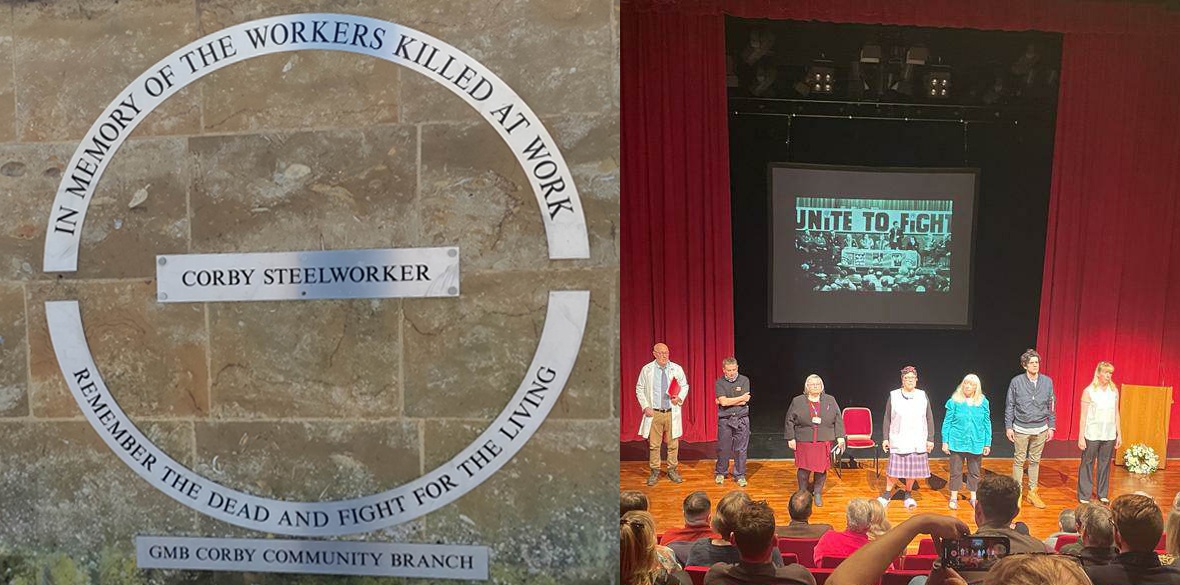This is the last article you can read this month
You can read more article this month
You can read more articles this month
Sorry your limit is up for this month
Reset on:
Please help support the Morning Star by subscribing here
The Planks Gave Way
The Corby Cube, Corby
THIS weekend in Corby, International Workers’ Memorial Day was marked with the hard-hitting play The Planks Gave Way, commissioned by GMB to commemorate 25 years of remembering fallen workers.
Written and directed by local artist and activist Paula Boulton, The Planks Gave Way references the deaths of men working at Corby steelworks who fell into molten steel while walking across planks of wood in the course of their duties.
It examines changing working practices and their effects upon workers both then and now, from burns to burnout, and highlights the vital role of trade unions in protecting workers.
The day, organised by the GMB, began with the laying of a wreath at the Steel Man statue in James Ashworth Square, accompanied by speeches from local councillors Alison Dalziel and Martyn Reuby, as well as Labour’s prospective parliamentary candidate Lee Barron.
Their own experiences of being personally touched in some way by workplace accidents reflects Corby’s history of heavy industry.
Indeed, all of the stories in The Planks Gave Way came from the genuine life experiences of work-related death, injury or loss of the people of Corby.
Northants community branch secretary of the GMB Alan Irwin prefaced the play with a speech, reflecting on the importance of unions in campaigning for improved workers’ rights and conditions using collective bargaining.
He also criticised the recent drift towards industry self-regulation and cuts to the Health and Safety Executive as detrimental to workers’ rights.
The play was then kicked off by Ian Cameron, singing a poignant self-written song, Accidents Song, about the disposability of workers in heavy industry.
Following this, we were introduced to Isa, a Glaswegian widow (played by Lola Dziarkowska), her daughter Fiona (Paula Boulton) and Fiona’s schoolfriend Kate (Sami Scott), who all gave their perspective of events following the death of Isa’s husband at the steelworks.
Audience members watched, many in tears, as a young union rep (played by Alan Irwin) was sent to deliver the news to Isa that her husband would not be coming home, and that there were no remains of him to bury.
The tensions between trade union reps and steelworks company management were explored by John Padwick, as work-study man, giving a perspective from management of how change can often be difficult to implement, and how it isn’t always welcome.
Moving forward in time and following the closure of the steelworks, themes of mass unemployment and the difficulties of retraining were explored drawing from one of Boulton’s previous plays, Women of Steel.
The closure of Corby steelworks brought cheap agency jobs and with it poverty, despite the empty promise of the enterprise zone.
George Reilly performed an original song, The Things We Used To Make, which lamented the loss of manufacturing and production jobs, and the loss of identity, pride and respect that went along with it.
Similar insecure working situations occur globally within sweatshops, and poor job security is the norm for many millions of people.
The attendant mental health issues associated with poor-quality employment and workplace issues such as high workload or bullying were also explored through Simon the electrician (Will Allen) struggling to hold onto a decent job and Tracey the admin worker (Sami Scott), bullied out of her role in a school.
This brought the play right up to present-day workers’ struggles, particularly pertinent given the number of sectors striking at the moment over conditions or pay.
The play ended with a thought-provoking monologue from the GMB rep (Rachelle Wilkins), hitting home that workplace accidents are about real people and real lives.
The Planks Gave Way tackled hard-hitting themes which affect millions of workers and their families annually. The importance of unions in protecting workers cannot be understated.
The play’s message was summarised in the closing lines, sing in unison by the full cast, who received an enthusiastic standing ovation from a full house, clearly moved to action by this effective, motivational and unique piece of theatre.
“Cutting corners kills. There will be no more suicides on our watch. Stand together, stand and fight, enough is enough. Time for us to go on strike, enough is enough!”
The Planks Gave Way — are we still dying at work or is it killing us?
For more information see gmbnorthants.org.









